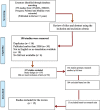Effects of simulation in improving the self-confidence of student nurses in clinical practice: a systematic review
- PMID: 37904153
- PMCID: PMC10614341
- DOI: 10.1186/s12909-023-04793-1
Effects of simulation in improving the self-confidence of student nurses in clinical practice: a systematic review
Abstract
Background: Considering the positive influence of simulation from previous literature may encourage educators to regard it as a valuable teaching strategy in nursing schools. This literature review aims to investigate whether the use of simulation improves undergraduate nurses' self-confidence during clinical practice.
Methodology: This study employed a literature-based design. Five academic databases, including CINAHL, EBSCO, ProQuest, PubMed and Medline, were utilised to extract relevant studies using appropriate keywords and Boolean operators. Studies published in the last 15 years (2005-2020) were included in the search. Studies were retrieved using the Exclusion and Inclusion criteria. The Critical Appraisal Skills Programme (CASP) was used to critically appraise the studies.
Results: A total of 15 primary research studies were extracted for review. Four major themes emerged from the review: Improved self-confidence to carry out clinical tasks, Increased ability to work in teams, Improved self-confidence to perform community work and Improved self-confidence in communicating with patients and team members.
Conclusion: Clinical simulation is a useful tool in increasing the self-confidence of nursing students to perform clinical tasks, make clinical judgements, communicate with patients and team members and improve their teamwork. To improve the quality of care received by patients, it is recommended that clinical simulations be integrated into the nursing curriculum in Saudi Arabia. Increasing the confidence of students has been shown to be associated with greater confidence in performing clinical tasks.
Keywords: Clinical practice; Self-confidence; Simulation; Student nurses.
© 2023. The Author(s).
Conflict of interest statement
The authors declare no competing interests.
Figures
References
-
- Guerrero JG, Tungpalan-Castro GM, Al Fergani B, Gomma NH, Hafiz AH, Pingue-Raguini M. Impact of high-fidelity and virtual simulation experiences on nurses’ acquired knowledge and skills for triaging suspected COVID-19 patients. Comput Educ. 2022;1100002. 10.1016/j.cexr.2022.100002.
-
- Sierra J. The potential of simulations for developing multiple learning outcomes: the student perspective. Int J Manag Educ. 2020;18(1):100361. doi: 10.1016/j.ijme.2019.100361. - DOI
Publication types
MeSH terms
Grants and funding
- RGP1/406/44./Deanship of Scientific Research at King Khalid University
- RGP1/406/44./Deanship of Scientific Research at King Khalid University
- RGP1/406/44./Deanship of Scientific Research at King Khalid University
- RGP1/406/44./Deanship of Scientific Research at King Khalid University
- RGP1/406/44./Deanship of Scientific Research at King Khalid University
LinkOut - more resources
Full Text Sources



